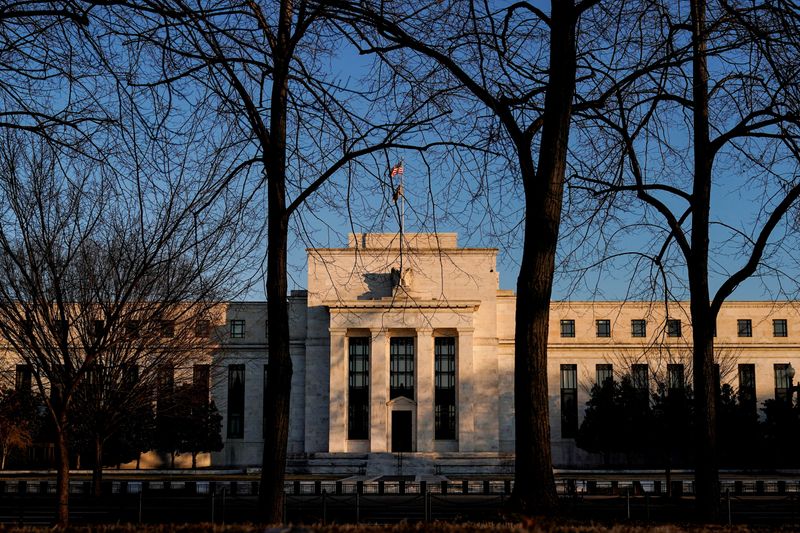By David Randall
(Reuters) - Expectations that the Federal Reserve will ease monetary policy in the early months of 2024 are fueling a searing year-end rebound in U.S. government bonds. Some investors believe those rate cut hopes are misplaced.
The yield on the benchmark U.S. 10-year Treasury, which moves inversely to prices, was recently at around 4.15%, down 87 basis points from a 16-year high reached in October. Last month's 52-point drop in yields was the biggest monthly decline since 2011.
Driving the moves are bets that falling inflation will push the Fed to begin cutting rates as early as March 2024 - a much more dovish timeline than investors had expected just a few months ago. Overall, investors are pricing in 126 basis points in rate cuts for next year.
The decline in Treasury yields has fueled a multi-asset rally that has lifted everything from bitcoin - which has surged to its highest level since April 2022 - to Cathie Wood’s Ark Innovation ETF, a bastion of speculative stocks that rose 31.4% in November alone.
Yet some investors believe Treasuries have rallied too quickly and expectations for Fed cuts may be premature. One reason: the Fed’s determination not to ease monetary policy too soon and invite a 1970s-style inflationary rebound. Some also worry the rallies in stocks and bonds may have loosened financial conditions, making it easier for inflation to heat back up.
“The market is getting ahead of itself and running with the more optimistic inflation story … and ignoring that there’s some probability of a scenario where the Fed has to be more aggressive and step in,” said Tony Rodriguez, head of fixed income strategy at Nuveen.
U.S. employment data due out on Friday could be one catalyst for yields’ short term trajectory, investors said, with a strong number potentially bolstering the case for rates remaining at current levels for longer.
Fed Chairman Jerome Powell has pledged not to cut rates before inflation is convincingly on its way to 2%, citing the experience of Fed officials in the 1970s who loosened policy prematurely. That allowed higher inflation to become more embedded, forcing their successors to impose such strict monetary medicine that it pushed the economy into recession.
George Bory, chief investment strategist for fixed income at Allspring Global Investments, believes investors are underestimating policymakers' determination not to repeat those mistakes. His firm has become more neutral in its bond positioning after the recent rally, which has gone “too far, too fast,” Bory said.
"In my opinion, the Fed has not given the all clear,” he said.
The Fed will pencil in its rate expectations for next year and beyond at its next monetary policy meeting, which concludes on Dec. 13. Policymakers are expected to leave rates unchanged this month.
Greg Whiteley, a portfolio manager at DoubleLine Group, said the market has misread the Fed - and been wrongfooted on Treasury yields - several times in the last few years. Wary of a yield rebound, he is currently "skeptical of any part of the yield curve."
“This has turned into a real mania in my view because I don’t think a Fed pivot is imminent,” he said. “The market has done this a half dozen times since the pandemic and it will be wrong again.”
Another concern is that loosening financial conditions - factors that reflect the availability of funding in an economy - could set the stage for a rebound in consumer prices, said Sameer Samana, senior global market strategist at Wells Fargo Investment Institute.
The Goldman Sachs Financial Conditions Index has fallen about 100 points from its late October peak.
"The Fed has been talking about higher for longer and clearly the market has undone some of that,” Samana said.
To be sure, plenty of investors believe Treasuries have further upside. Emily Roland, co-chief investment strategist at John Hancock Investment Management, believes a continuing softening of the labor market driving both inflation and Treasury yields lower.

History suggests that 10-year yields fall by an average of 0.9% in the six months following the last rate hike of the cycle, according to John Hancock data. While that would put the 10-year yield below 3% by January - a move Roland believes is unlikely - the data suggests there is more room for yields to fall, she said.
"The move has been very swift so we wouldn't be surprised to see some consolidation but ultimately we see bond yields moving lower into next year," Roland said.